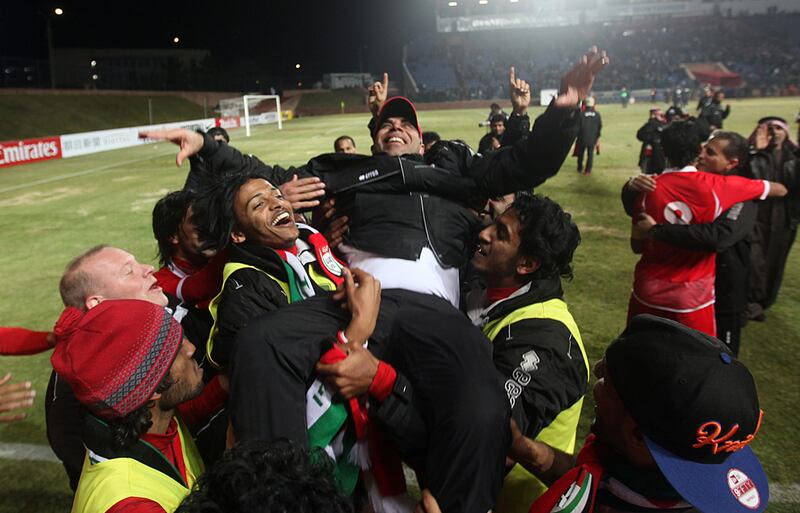It was not quite two years ago and certainly we have not forgotten how improbable the outcome, how exhilarating the ride. But “UAE 3, Uzbekistan 2” seems as if it belongs to another age.
Perhaps because so many accomplishments have come in the wake of it. The three tight matches in the global glare of the London Olympics; the Gulf Cup championship; the relentless qualification for the Asian Cup; 2013, The Year Without Defeat.
Nine days short of two years and Mahdi Ali and a UAE national side have returned to Tashkent. The match on Wednesday in the Uzbek capital has almost no international ramifications for Emirati football; both sides already have booked their passage to the 2015 Asian Cup.
That was not the case, on March 14, 2012, when the UAE’s Under-23 team faced Uzbekistan for very high stakes, indeed.
A victory or draw would put the Emiratis in the Olympic football tournament for the first time, the biggest achievement by a national side since the 1990 World Cup.
An Uzbekistan victory at the JAR Stadium would send the central Asians to London and the UAE to Hanoi, the first step on a little-hope backdoor qualification route that would include a three-way competition with Oman and Syria ahead of a winner-goes-to-London clash with Senegal in Coventry.
The degree of difficulty faced by Mahdi Ali’s side can hardly be overstated.
A wet and cold city far from home; a sloppy, rain-sodden pitch; an opponent with everything to play for; the memory of being held by these same Uzbeks in Al Ain three months before; fewer than 200 UAE fans in a corner of the packed stands.
The 2-0 deficit.
Oleg Zoteev took advantage of a chain-reaction UAE defensive breakdown to score from the edge of the box in the 34th minute; Fozil Musaev doubled the lead with a header in the 46th minute. The distance from Abu Dhabi to London never seemed longer.
Then came the turnaround Emirati fans likely will never forget.
The UAE won a free kick in the 50th minute and Ahmed Khalil stood over the ball five yards outside the box, to the left of the goal.
His heavy shot seemed to glance off the head of an Uzbek in the wall, wrong-footing the keeper, and the ball had plenty of momentum to carry it into the goal.
Omar Abdulrahman, his mop of hair about half the size it is now, snatched the ball out of the net and sprinted to the halfway line, where he set it down, epitomising a side eager to resume the fray.
Four minutes later, the reinvigorated Emiratis pushed up the left side. Abdulaziz Sanquor, coming forward from his left-back spot, carried it to Rashid Essa, along the touchline, and the midfielder reached the level of the box, stopped, backed up and with his right foot sent a square pass into the box to Abdulrahman, who flicked the ball with the outside of his left foot towards Khalil, somehow knowing exactly where to find his teammate.
Khalil volleyed it into the goal and the excitable TV announcer, Faris Awad, who was born for moments like this one, practically shouted himself into unconsciousness.
The Emiratis swarmed Khalil near the goal line, with the reserves joining in.
Mahdi Ali was the one man who kept his cool; expressionless, he made a thumbs-up signal towards the celebrating players and got back to coaching.
It was the 54th minute, and London was now just 36 minutes away.
Khalid Essa, the UAE keeper, faced almost no serious threats from a disorganised and desperate Uzbek side as the clock ticked towards 90 minutes.
In the third minute of added time little Haboush Saleh put away a pass from fellow substitute Ali Mabkhout and the celebration was on.
In the raucous UAE changing room beneath the stadium, everyone hugged everyone else – players, coaches, staff, officials, after they had said the Isha prayer on a carpet laid in a hallway.
Players bounced through the room, they wore enormous wigs in UAE colours and gloried in the pure joy of a team of young men who have won a special victory.
Hamdan Al Kamali, the captain that night, said: “How I feel? Ha ha! All the people are happy now!”
Now it comes full circle. Mahdi Ali’s team of U23 boys are the men of the rising UAE national side.
Their goals are loftier than London: they include a first Asian Cup championship and a place at the 2018 World Cup.
But the veterans of Tashkent 2012 can be forgiven for casting back their thoughts towards a turning point in the history of Emirati football.
poberjuerge@thenational.ae
Follow our sports coverage on Twitter @SprtNationalUAE





